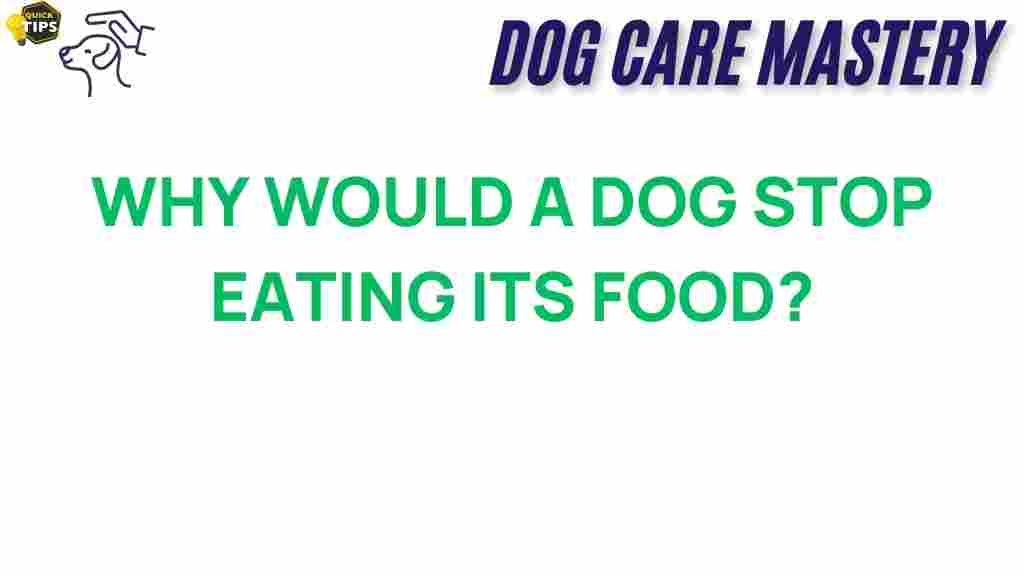Dog Eating Habits: Unraveling the Mystery of Why Dogs Sometimes Refuse Their Food
As a dog owner, it’s not uncommon to experience the bewildering moment when your beloved pet turns its nose up at food. This behavior can be puzzling, especially since dogs are known for their hearty appetites. Understanding your dog’s eating habits is crucial for their health and well-being. In this article, we will explore the various reasons why dogs may refuse their food, what steps you can take to encourage better eating habits, and tips for troubleshooting these issues.
Understanding Common Reasons for Food Refusal
Before diving into solutions, it’s essential to understand why your dog may be refusing its food. Here are some common reasons:
- Health Issues: Medical conditions such as dental problems, gastrointestinal issues, or infections can lead to a loss of appetite.
- Changes in Routine: Dogs are creatures of habit. Any significant change in their environment, such as moving homes or changes in the owner’s schedule, can impact their eating habits.
- Food Preferences: Just like humans, dogs have their preferences. They might not like the current food’s taste or texture.
- Overfeeding: If your dog is consistently given treats or table scraps, they may become picky eaters.
- Stress or Anxiety: Behavioral issues or emotional stress can also lead to a decrease in appetite.
Step-by-Step Process: Assessing Your Dog’s Eating Habits
If your dog starts refusing food, follow this step-by-step guide to assess the situation effectively:
Step 1: Observe Your Dog
Take note of your dog’s behavior. Are they displaying any signs of illness, such as vomiting, diarrhea, or lethargy? Observe their body language and mood during meal times.
Step 2: Check for Health Issues
If your dog has not eaten for more than 24 hours, it’s crucial to consult your veterinarian. Health issues could be the underlying cause, and a professional examination is necessary.
Step 3: Evaluate Their Food
Examine the food you are providing. Is it fresh? Is it a brand your dog has eaten before? Consider any recent changes in their diet that might have affected their appetite. Sometimes, switching to a different flavor or brand can reignite their interest.
Step 4: Maintain a Consistent Feeding Schedule
Establish a consistent feeding routine. Try to feed your dog at the same time every day. This can help them develop a habit and associate specific times with meals.
Step 5: Limit Treats
Ensure that you are not overfeeding treats or table scraps, which can lead to a lack of interest in their regular meals. Treats should only make up a small portion of their overall diet.
Troubleshooting Tips for Picky Eaters
If your dog is still refusing food after assessing their habits, here are some troubleshooting tips to encourage better eating:
- Mix in Toppers: Adding a small amount of wet food, broth, or dog-safe toppings can make the food more enticing.
- Change Feeding Location: Sometimes, a change in the environment can stimulate interest. Try feeding your dog in a quieter or different area.
- Ensure Fresh Water: Make sure that your dog always has access to fresh water. Dehydration can also lead to a reduced appetite.
- Try Interactive Feeders: These can make mealtime more engaging. Interactive feeders encourage your dog to work for their food, stimulating their mind and increasing interest in eating.
- Practice Patience: If your dog is not eating, don’t panic. It’s essential to remain calm and patient. Pushing them to eat can create negative associations with mealtime.
When to Consult a Veterinarian
If your dog continues to refuse food for an extended period or displays additional concerning symptoms, it may be time to consult a veterinarian. Some signs that warrant a visit include:
- Persistent vomiting or diarrhea
- Excessive lethargy or weakness
- Changes in behavior or mood
- Weight loss or failure to gain weight
It’s always better to err on the side of caution. Your veterinarian can help identify any underlying health issues and provide guidance on how to address your dog’s eating habits.
Conclusion: Nurturing Healthy Eating Habits
Understanding your dog’s eating habits is essential for their overall health and well-being. By observing their behavior, evaluating their food, and maintaining a consistent feeding schedule, you can help your dog develop a healthy relationship with food. If issues persist, don’t hesitate to seek professional help. Remember, every dog is unique, and what works for one may not work for another. With patience and care, you can unravel the mystery behind your dog’s food refusal and foster a happier, healthier eating experience.
For more information on dog nutrition, check out this comprehensive guide.
If you’re looking to improve your dog’s overall well-being, consider exploring different training techniques that can lead to a more harmonious relationship with food.
This article is in the category Health and created by dogcaremastery Team
